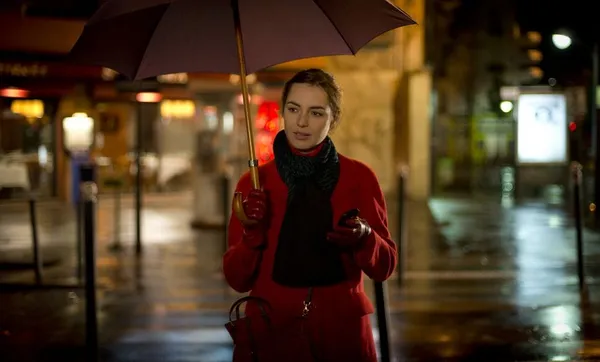 |
| Louise Bourgoin as Judith in Miss And The Doctors |
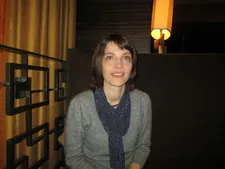 |
| Miss And The Doctors director Axelle Ropert: "I love films that have goodness, tenderness and a dream-like quality." Photo: Anne-Katrin Titze |
During New York's Rendez-Vous with French Cinema, Ropert and I discussed costumes of Jacques Demy, the influence of Garry Marshall's Frankie And Johnny, the tenderness of Michelle Pfeiffer and Al Pacino, where some of the depictions by Martin Scorsese and his Wolf Of Wall Street lack nobility, and the street where we live(d).
In the film, the 13th arrondissement of Paris, undeservedly ignored by cinema, is the slightly enchanted land where two paediatrician brothers - Boris (Kahn) and Dimitri (Stocker) live and work. All the children in the diverse neighbourhood know them by name as the Pizarnik brothers and most adults are happy to see them on their nightly walks. They seem to walk and work so much at night that you might wonder if they have some Vampire blood in them. Ropert keeps her spectators on alert by creating a marvellously uncommon mood throughout her movie that blends the mundane with the celebratory.
Anne-Katrin Titze: I loved how you start your film with a little boy in a doctor's costume.
Ropert: The little boy is my son.
AKT: As a result of that costume, I wasn't really sure if the two doctors we meet are actually real doctors. There is an enchanted quality of fairy tales about them. The male versions of Snow White and Rose Red. Were you going for that?
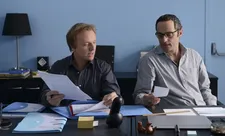 |
| Laurent Stocker and Cédric Kahn. "In the case of the two brothers - we have one who finds the love of his life and one who remains more or less a child." |
AKT: Part of that dreamy quality comes from the neighborly interactions. Everybody knows the doctor brothers, everybody is very friendly. Where did you film all these uncommon interactions on the streets and in the shops?
AR: The film is shot in a very special, very particular neighborhood in Paris which is the Chinatown of Paris, a neighborhood you never see in French films and it's where I live. I wanted to shoot there because this particular neighborhood is like a little village. In that village there are figures who are very well known like the pharmacist or the doctor.
AKT: Years ago, in Paris I used to live in the 13th arrondissement on Avenue d'Italie.
AR: I live on Avenue d'Italie! That's my address.
AKT: No wonder I felt It was dream-like. Tell me about the clothes for your female protagonist Judith (Louise Bourgoin). I like the theatricality - the blue skirt and nude velvet top first makes you think she could be a performer. The use of colour for the costumes reminded me of Jacques Demy.
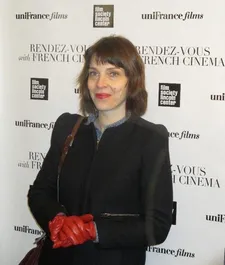 |
| Axelle Ropert at Rendez-Vous with French Cinema Opening Night at the Paris Theatre Photo: Anne-Katrin Titze |
AKT: I haven't seen it in many years. Now I want to take another look. The concept of sweetness is brought up on different levels in your film. There is the literally super-sweet coconut pastry that is offered and the little girl who is diabetic. What are your ideas about sweetness?
AR: It's complex. I love films that have goodness, tenderness and a dream-like quality. It's difficult to do that and not make it a naive kind of overly sweet film. The challenge was to ally cruelty and tenderness in the same film. We have the little girl who can be filmed tenderly but she could die in the next moment as well. In the case of the two brothers - we have one who finds the love of his life and one who remains more or less a child.
AKT: Your choice of the two brothers is very interesting. They look nothing alike and yet, you completely believe they are brothers. Tell me about this casting.
AR: They are total opposites - one is short, one is tall, one is blond, the other has brown hair, one [Stocker as Dimitri] is from the Comédie Française, the other [Boris played by Kahn] is not an actor at all.
AKT: He is played by director Cédric Kahn.
AR: Precisely. Through the power of cinema you can have them be total opposites and still make the audience believe they are brothers.
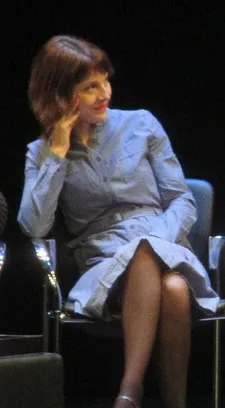 |
| Axelle Ropert on Julie Gayet's Cinéast(e)s panel at the French Institute Alliance Française: "I work with a lot of female technicians." Photo: Anne-Katrin Titze |
AR: There's two things. In my neighbourhood there are many Chinese prostitutes and I see them often, almost every day and every time I see them, my heart seizes up, tightens. Secondly, I don't like at all the way prostitutes are depicted in films, especially in films by Scorsese. In fact, it disgusts me. I haven't seen the Wolf Of Wall Street but this very vulgar crass representation is how people are talking about them. I wanted a more noble representation. More respect and more compassion for something I consider a hellish trade.
Ropert was on Julie Gayet's Cinéast(e)s Action! French & American Women Filmmakers panel at the French Institute Alliance Française in New York, you can read more about that here.





















